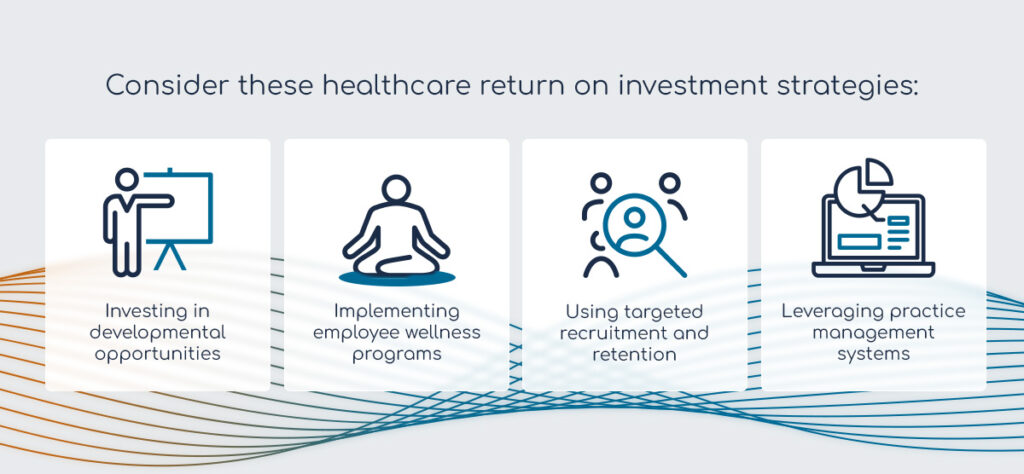Human resources (HR) departments play a vital role in organizations. From hiring qualified professionals and delivering quality training materials to contributing to a positive company culture, HR navigates and helps organizations overcome many issues.
Healthcare HR teams face unique challenges as the hustle and bustle and the demanding work of the industry can create more obstacles for teams to overcome. With ever-evolving regulatory changes, staff shortages, and new emerging technologies, HR roles stretch across departments and have large-scale impacts.
One vital element to consider is Return On Investment (ROI). HR ROI may look different in healthcare than in other industries. In order to support healthcare facilities, recognizing best practices and implementing strategies for boosting efficiency and reducing costs is crucial.
What Is HR Return on Investment in Healthcare?
HR departments contribute to ROI in several ways. By managing employee costs, identifying areas for cost reduction, and hiring qualified workers, HR teams positively impact a facility’s financial health. However, it’s also important to consider nonfinancial ROI.
Industries like healthcare often see returns in nonfinancial benefits, such as improved patient satisfaction, reduced readmissions, and enhanced care quality. Consider these key metrics to understand facility growth and progress:
- Patient outcomes: Well-managed workforces directly impact patient care outcomes. HR practices associated with efficiency, effectiveness, performance, and retention affect patient care. With boosted patient outcomes, healthcare facilities are more likely to have return patients, word-of-mouth referrals, and an enhanced reputation, which can lead to more consistent revenue streams.
- Staff engagement: HR teams can implement effective management solutions to increase employee productivity and engagement. Effective solutions ensure providers complete tasks where they’re needed most, aligning skills with availability. Research shows that engaged employees perform around 20% better than nonengaged colleagues. These higher engagement levels also lead to better quality patient care, improved reporting, and reduced absenteeism and turnover.
- Retention: High turnover rates negatively impact a facility’s ROI. With each new hire comes the need for training, development, and other timely and costly processes. When these employees leave the facility, the resources a team uses to prepare them for the job become wasted. Numbers suggest training new staff for any position can cost tens of thousands of dollars.
Healthcare ROI-Focused HR Strategies

ROI is a critical tool for analyzing facility investments and assessments. In order to optimize resource allocation, promote growth, and improve financial health, HR teams must leverage best practices. Consider these healthcare return on investment strategies:
- Investing in developmental opportunities: Professional development bolsters benefits for workers and patients. For healthcare employees, training and development equip them with the skills and knowledge to pursue high-paying positions and increase job satisfaction. For patients, staff professional development promotes the use of best practices to support patient care. On average, organizations with developmental opportunities experience a 30%-50% employee retention increase.
- Implementing employee wellness programs: With more workers facing burnout, there is a renewed focus on employee well-being. Wellness programs that support emotional, personal, and financial wellness can equip team members with tips and advice to feel their best in their personal and professional lives. Creating meaningful wellness programs can help reduce absenteeism and empower employees to feel and perform their best.
- Using targeted recruitment and retention: Targeted recruitment can help healthcare organizations overcome common recruitment challenges. HR teams should implement hiring practices that prioritize long-term commitments and a solid cultural fit. Teams should also use robust onboarding to ensure seamless employee integration and increased satisfaction. These strategies can help reduce turnover rates and lower recruitment spending.
- Leveraging practice management systems: Working with a solutions provider can help teams uncover facility-specific strategies to implement. For example, DoctorsManagement, LLC specializes in holistic practice management. Teams can lighten HR responsibilities, improve employee satisfaction, increase efficiency, and meet compliance with HR consulting services.
Ways HR Can Reduce Costs and Boost Efficiency
The possibilities for change and improvement in the healthcare industry are never-ending. HR teams can reduce costs and boost efficiency by:
- Optimizing scheduling: Burnout is a significant problem in the healthcare industry. Studies show that 46% of health workers have experienced it. Preventing employee burnout with strategies like scheduling optimization can have a drastic impact on facilities. Teams can use software to track employee availability, manage shifts, and forecast staffing needs to prevent shortages. These solutions can increase efficiency by ensuring organizations can meet patient demands without adding loads to overworked employees. Optimized scheduling can also reduce costs by preventing overtime spending or having too many workers in the building with little to do at a time.
- Implementing automation: Advanced technologies like artificial intelligence and machine learning offer immense possibilities for healthcare organizations. Facilities can use them to automate documentation processes, monitor progress, lower administrative strain, and enhance team coordination. Leveraging these tools empowers workers to spend time on more meaningful tasks while allowing organizations to get more done at one time.
- Conducting compliance training: Using technology efficiently, understanding compliance demands, and supporting staff competency enhances productivity and patient outcomes. Compliance training can mitigate risks that could have costly outcomes, protect organizational reputation, and provide patient security and peace of mind. Compliance training standardizes facility processes, equipping workers with best practices for minimizing errors, preventing mistakes, and boosting efficiency overall.
Increase Profits and Productivity With DoctorsManagement, LLC
HR plays a significant role in boosting efficiency, reducing overhead costs, and driving solutions to improve financial health. However, HR roles are complex, and improvement should be ongoing. When you need to simplify processes, streamline workflows, and find holistic solutions, partnering with a solutions provider can provide peace of mind and help you unlock efficiencies.
At DoctorsManagement, LLC, you can find expert consultants who simplify HR operations and reduce strain. Our HR professionals have more than 25 years of experience helping healthcare organizations tackle complexities. Whether you need help recruiting skilled staff, need holistic improvement strategies, or want to find other cost-effective ways to improve your organization, we’re here to help. Please schedule a consultation with us to discover how we can help increase your profits and productivity.
























